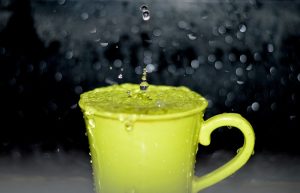This year’s World Water Day focused on accelerating change to provide universal access to water, sanitation and hygiene (WASH) services, a goal that the Nigerian government hopes to achieve by 2030 with a range of local and national initiatives.

Through the Nigeria Sustainable Urban and Rural Water Supply, Sanitation, and Hygiene Programme (SURWASH) at least 6 million people have been provided with drinking water since 2020, while the recently inaugurated YouthWASH programme aims to engage young people in strengthening the water sector. In addition, smaller localised changes to water systems are being supported by international organisations to ensure even remote areas gain access to uncontaminated drinking water.
Removing the Risk of Lead Poisoning
Some of the most dangerous contaminants in water are toxic metals which can enter drinking water from natural sources in the soil, corroded lead piping, or because of human activity. Consuming water containing lead can be very harmful and around the world steps are taken to remove it from drinking water through filtration and distillation. Children are amongst the worst affected by any type of contaminated water and in Anka, a mining town in Zamfara State, more than 600 children have died from lead poisoning and many more left with disabilities.
The consequences of small-scale gold mining and processing was contaminating the water in small villages with lead, however, with help and advice from international health and engineering organisations, residential areas are no longer exposed to lead contamination and cases of poisoning have been almost completely eradicated.
Using Solar Power to Extract Groundwater
Pumping water from the ground is still one of the best ways to provide a constant supply of safe drinking water to local communities. Motor-powered pumping systems are able to deliver larger quantities of water and replacing diesel fuel with solar power ensures a sustainable flow of water. So far, over 4,500 solar supply systems have been installed throughout Nigeria by UNICEF, replacing old broken hand pumps for small villages, large communities and essential health facilities that are especially in need of uncontaminated water.
Harvesting Rainwater to Ease Water Scarcity
In areas where groundwater sources are under pressure or the infrastructure for water systems is currently lacking, collecting rainwater could provide a sustainable and safe alternative for use in the home, on the farm and even in industry. Water tanks of various sizes can be easily installed and used to harvest rainwater during the rainy season. The water is then stored safely away from contaminants ready for use during times when water is scarce.
While contaminated water remains a serious problem in Nigeria, a number of local and nationwide initiatives to improve the availability of safe drinking water are beginning to see very positive results. From reducing exposure to contaminants to installing sustainable water collection systems, government schemes with help from international development partners aim to drastically improve Nigeria’s water safety and sanitation within the next few years.
By Jackie Edwards
